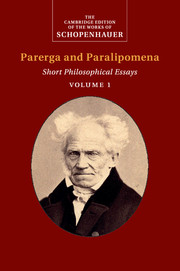Book contents
- Frontmatter
- Contents
- General Editor’s Preface
- Editorial Notes and References
- Introduction
- Notes on Text and Translation
- Chronology
- Bibliography
- Parerga and Paralipomena: Contents
- Preface
- Sketch of a History of the Doctrine of the Ideal and the Real
- Fragments for the History of Philosophy
- On University Philosophy
- Transcendent Speculation on the Apparent Deliberateness in the Fate of the Individual
- Essay on Spirit-Seeing and Related Issues
- Aphorisms on the Wisdom of Life
- Chapter I Fundamental Division
- Chapter II What One Is
- Chapter III What One Has
- Chapter IV What One Represents
- Chapter V Counsels and Maxims
- Chapter VI On the Different Stages of Life
- Versions of Schopenhauer’s Text
- Glossary of Names
- Index
Chapter I - Fundamental Division
Published online by Cambridge University Press: 30 June 2022
- Frontmatter
- Contents
- General Editor’s Preface
- Editorial Notes and References
- Introduction
- Notes on Text and Translation
- Chronology
- Bibliography
- Parerga and Paralipomena: Contents
- Preface
- Sketch of a History of the Doctrine of the Ideal and the Real
- Fragments for the History of Philosophy
- On University Philosophy
- Transcendent Speculation on the Apparent Deliberateness in the Fate of the Individual
- Essay on Spirit-Seeing and Related Issues
- Aphorisms on the Wisdom of Life
- Chapter I Fundamental Division
- Chapter II What One Is
- Chapter III What One Has
- Chapter IV What One Represents
- Chapter V Counsels and Maxims
- Chapter VI On the Different Stages of Life
- Versions of Schopenhauer’s Text
- Glossary of Names
- Index
Summary
Aristotle (NicomacheanEthics I, 8) divided the goods of humanlife into three classes – those coming from outside,those of the soul, and those of the body. Retainingnothing but the triad itself, I claim that whatmakes the difference in the lot of mortals may bereduced to three fundamental stipulations. Theyare:
(1) What one is: that is, personality in thewidest sense. Hence this includes health,strength, beauty, temperament, moral character,and intelligence and its cultivation.
(2) What one has:that is, property and possessions in everysense.
(3) What one represents: By this expression weusually mean what someone is in the eyes ofothers, thus how he is represented by them. Hence it consistsin their opinion of him and is divided intohonour, rank, and fame.
The differences to be considered under the firstcategory are ones that nature itself has createdbetween human beings, from which we can concludethat their influence on people's happiness orunhappiness will be much more essential and drasticthan what is effected by the differences arisingmerely from human determinations and mentioned underthe subsequent two categories. All the advantages ofrank, birth, even royal birth, wealth, and so on,relate to genuine personalmerits – such as a great mind or a greatheart – as kings on the stage relate to kings inreal life. Metrodorus,the first disciple of Epicurus, already titled achapter: ‘The cause of happiness that arises fromwithin ourselves is greater than that which comesfrom things.’ – See Clement of Alexandria, Stromata II, 21, p. 362 ofthe Würzburg edn. of the OperaPolemica. And the principal element inthe well-being of human beings, indeed, in theentire manner of their existence, is what exists orhappens within themselves. For it is actually herethat our inner satisfaction or dissatisfaction isimmediately located, which is primarily the resultof our sensing, willing, and thinking, whereasanything external only has an indirect influence onit. Hence the same external events or circumstancesaffect each one of us completely differently; andeven in the same environment, everybody lives in adifferent world. For we are immediately concernedonly with our own representations, feelings, andmovements of the will; external things onlyinfluence us as far as they cause these.
- Type
- Chapter
- Information
- Schopenhauer: Parerga and ParalipomenaShort Philosophical Essays, pp. 275 - 281Publisher: Cambridge University PressPrint publication year: 2014

